Related Research Articles
Old English, or Anglo-Saxon, is the earliest recorded form of the English language, spoken in England and southern and eastern Scotland in the early Middle Ages. It developed from the languages brought to Great Britain by Anglo-Saxon settlers in the mid-5th century, and the first Old English literary works date from the mid-7th century. After the Norman conquest of 1066, English was replaced, for a time, by Anglo-Norman as the language of the upper classes. This is regarded as marking the end of the Old English era, since during this period the English language was heavily influenced by Anglo-Norman, developing into a phase known now as Middle English in England and Early Scots in Scotland.

The Saxons were a group of Germanic peoples whose name was given in the early Middle Ages to a large country near the North Sea coast of northern Germania, in what is now Germany. In the late Roman Empire, the name was used to refer to Germanic coastal raiders, and in a similar sense to the later "Viking". Their origins are believed to be in or near the German North Sea coast where they appear later, in Carolingian times. In Merovingian times, continental Saxons had been associated with the activity and settlements on the coast of what later became Normandy. Their precise origins are uncertain, and they are sometimes described as fighting inland, coming into conflict with the Franks and Thuringians. There is possibly a single classical reference to a smaller homeland of an early Saxon tribe, but its interpretation is disputed. According to this proposal, the Saxons' earliest area of settlement is believed to have been Northern Albingia. This general area is close to the probable homeland of the Angles.

Yule is a winter festival historically observed by the Germanic peoples that was incorporated into Christmas during the Christianisation of the Germanic peoples and in the modern period is celebrated separate to the Christian festival by adherents of some new religious movements such as Modern Germanic paganism. Scholars have connected the original celebrations of Yule to the Wild Hunt, the god Odin, and the heathen Anglo-Saxon Mōdraniht. The term Yule and cognates are still used in English and the Scandinavian languages as well as in Finnish and Estonian to describe Christmas and other festivals occurring during the winter holiday season. Furthermore, some present-day Christmas customs and traditions such as the Yule log, Yule goat, Yule boar, Yule singing, and others may have connections to older pagan Yule traditions.

Æsir or ēse are gods in Germanic paganism. In Old Nordic religion and mythology, the precise meaning of the term "Æsir" is debated, with it being able to refer to both the gods in general or specifically to one of the main families of gods, in contrast to the Vanir, with whom they waged war, ultimately leading to a joining of the families. The term can further be used to describe local gods that were believed to live in specific features in the landscape such as fells. In the Old English Wið færstice, the Ēse are referred to, along with elves, as harmful beings that could cause a stabbing pain, although exactly how they were conceived of by the author of the text is unclear.

Wyrd is a concept in Anglo-Saxon culture roughly corresponding to fate or personal destiny. The word is ancestral to Modern English weird, whose meaning has drifted towards an adjectival use with a more general sense of "supernatural" or "uncanny", or simply "unexpected".
Paulinus was a Roman missionary and the first Bishop of York. A member of the Gregorian mission sent in 601 by Pope Gregory I to Christianize the Anglo-Saxons from their native Anglo-Saxon paganism, Paulinus arrived in England by 604 with the second missionary group. Little is known of Paulinus's activities in the following two decades.

A kobold is a mythical sprite. Having spread into Europe with various spellings including "goblin" and "hobgoblin", and later taking root and stemming from Germanic mythology, the concept survived into modern times in German folklore.
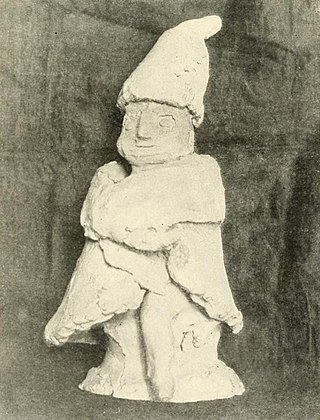
A household deity is a deity or spirit that protects the home, looking after the entire household or certain key members. It has been a common belief in paganism as well as in folklore across many parts of the world.

Germanic paganism or Germanic religion refers to the traditional, culturally significant religion of the Germanic peoples. With a chronological range of at least one thousand years in an area covering Scandinavia, the British Isles, modern Germany, and at times other parts of Europe, the beliefs and practices of Germanic paganism varied. Scholars typically assume some degree of continuity between Roman-era beliefs and those found in Norse paganism, as well as between Germanic religion and reconstructed Indo-European religion and post-conversion folklore, though the precise degree and details of this continuity are subjects of debate. Germanic religion was influenced by neighboring cultures, including that of the Celts, the Romans, and, later, by the Christian religion. Very few sources exist that were written by pagan adherents themselves; instead, most were written by outsiders and can thus present problems for reconstructing authentic Germanic beliefs and practices.

Beowa, Beaw, Bēow, Beo or Bedwig is a figure in Anglo-Saxon paganism associated with barley and agriculture. The figure is attested in the Anglo-Saxon royal genealogies as they were extended in the age of Alfred, where Beowa is inserted as the son of Scyld and the grandson of Sceafa, in lineages carried back to Adam. Connections have been proposed between the figure of Beowa and the hero Beowulf of the poem of the same name and English folk song figure John Barleycorn.
In Germanic mythology, Seaxnēat or Saxnōt was the national god of the Saxons.
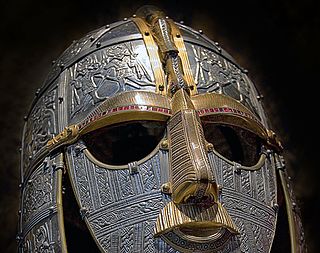
Anglo-Saxon paganism, sometimes termed Anglo-Saxon heathenism, Anglo-Saxon pre-Christian religion, or Anglo-Saxon traditional religion, refers to the religious beliefs and practices followed by the Anglo-Saxons between the 5th and 8th centuries AD, during the initial period of Early Medieval England. A variant of Germanic paganism found across much of north-western Europe, it encompassed a heterogeneous variety of beliefs and cultic practices, with much regional variation.
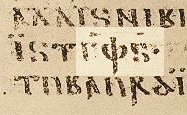
The English word god comes from the Old English god, which itself is derived from the Proto-Germanic *gudą. Its cognates in other Germanic languages include guþ, gudis, guð, god, and got.
In Germanic paganism, a vé or wēoh is a type of shrine, sacred enclosure or other place with religious significance. The term appears in skaldic poetry and in place names in Scandinavia, often in connection with an Old Norse deity or a geographic feature.
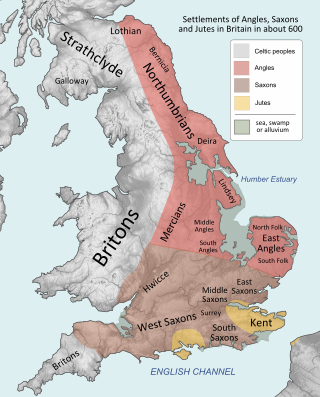
The Gregorian mission or Augustinian mission was a Christian mission sent by Pope Gregory the Great in 596 to convert Britain's Anglo-Saxons. The mission was headed by Augustine of Canterbury. By the time of the death of the last missionary in 653, the mission had established Christianity among the southern Anglo-Saxons. Along with the Irish and Frankish missions it converted Anglo-Saxons in other parts of Britain as well and influenced the Hiberno-Scottish missions to Continental Europe.
The Christianisation of Anglo-Saxon England was a process spanning the 7th century. It was essentially the result of the Gregorian mission of 597, which was joined by the efforts of the Hiberno-Scottish mission from the 630s. From the 8th century, the Anglo-Saxon mission was, in turn, instrumental in the conversion of the population of the Frankish Empire.

In the Gaulish language, Dusios was a divine being among the continental Celts who was identified with the god Pan of ancient Greek religion and with the gods Faunus, Inuus, Silvanus, and Incubus of ancient Roman religion. Like these deities, he might be seen as multiple in nature, and referred to in the plural (dusioi), most commonly in Latin as dusii. Although the Celtic Dusios is not described in late-antique sources independently of Greek and Roman deities, the common functionality of the others lay in their ability to impregnate animals and women, often by surprise or force. Dusii continue to play a role in the magico-religious belief systems of Gaul and Francia as a type of incubus in early-medieval paganism and Christianity.
Magic in Anglo-Saxon England refers to the belief and practice of magic by the Anglo-Saxons between the fifth and eleventh centuries AD in Early Mediaeval England. In this period, magical practices were used for a variety of reasons, but from the available evidence it appears that they were predominantly used for healing ailments and creating amulets, although it is apparent that at times they were also used to curse.
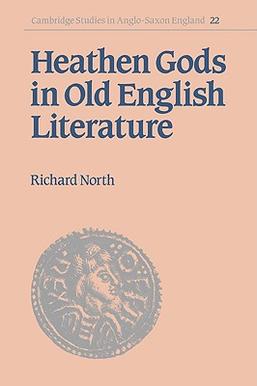
Heathen Gods in Old English Literature is a historical study of the literary references for several pagan deities in Anglo-Saxon England. Written by the English studies scholar Richard North of University College London, it was first published by Cambridge University Press in 1997. The book was released as the twenty-second monograph in the Press' series Cambridge Studies in Anglo-Saxon England, edited by Simon Keynes, Michael Lapidge and Andy Orchard. Prior to the book's publication, North had previously authored other studies of Anglo-Saxon paganism, such as Pagan Words and Christian Meanings (1991).
References
- ↑ Joseph Bosworth (1838). A Dictionary of the Anglo-Saxon Language. Longman, Rees, Orme, Brown, Green, and Longman. p. 80.
- 1 2 Dowden, Ken (2000). European Paganism: The Realities of Cult from Antiquity to the Middle Ages. London and New York: Routledge. p. 229. ISBN 0-415-12034-9.
- ↑ "Cove-Gods", An Other Dictionary.
- ↑ Dictionary of Old English Corpus s.v. cofgodas.